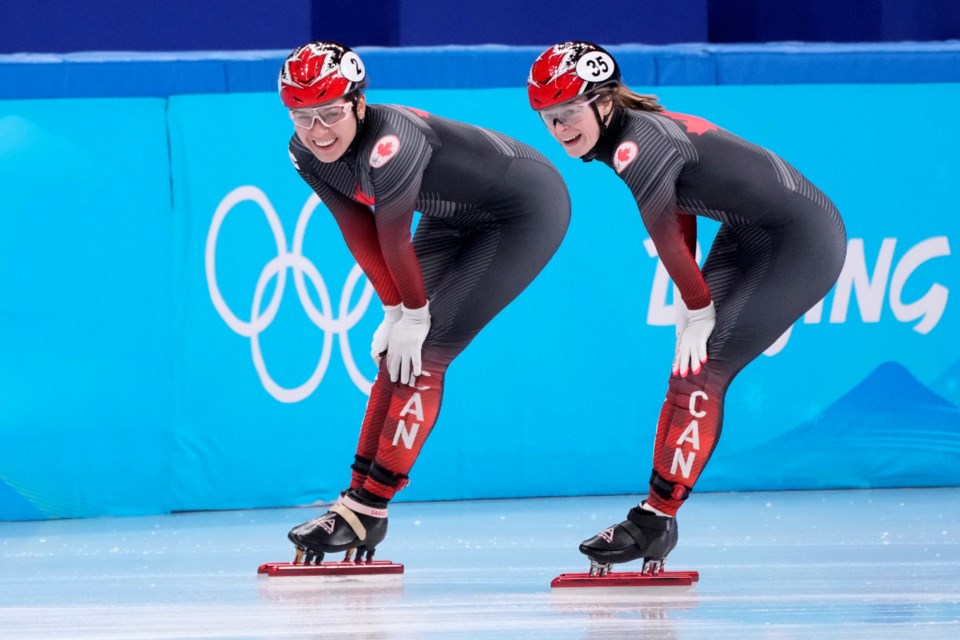BEIJING — Athletes are under enormous pressure at the Olympics, competing under a spotlight that comes just once every four years.
This pressure can amplify the wins and moments of glory, but also can make failure feel particularly crushing.
Short-track speedskater Courtney Sarault didn't think she'd be able to return to the start line, two days after missing the bronze in the relay.
"I felt like it was a failure for my Olympics," she said. "Other people aren’t saying that, but I’m really hard on myself.
"I took it really hard. I felt my body started shutting down after that. I was really hard on myself."
The skater from New Brunswick said she didn't think she'd be able to come back and skate "with a good mindset and attitude," but she did, finishing 11th in Wednesday's 1,500 metres.
"The fact that I was able to overcome what I thought I couldn’t overcome, I’m really proud of myself and that gives me the confidence and shows me how strong I really am," she said.
Sarault said she was grateful for the support she's received, especially from fellow athletes like Kim Boutin. Boutin was well-equipped to help her teammate, since she went through her own difficult moments four years ago at the Pyeongchang Olympics.
After Boutin was promoted to the podium after a South Korean skater was disqualified, she received a barrage of online hate and threats that would take her years to work through with the help of a psychologist who specializes in trauma.
"I think we're here to live a big event and make memories, but we can destroy ourselves in those things," Boutin said. "It's supposed to be fun, it’s supposed to be something we want."
Sarault wasn't the only one to go through tough times in Beijing.
Canadian freestyle skier Olivia Asselin pulled out of the slopestyle event due to physical and mental exhaustion. Curler Rachel Homan was so devastated by her failure to win a medal in mixed doubles that she wrote about finding herself in the "deepest of black holes." Long-track speedskater Ivanie Blondin, a childhood friend of Homan's, said she'd almost been ready to go home after disappointing performances in her first two individual events, before rebounding to win two medals.
And it's not only Canadian athletes who go through it, either.
Look at the debacle that took place in the Russian figure skating team: Kamila Valieva crumbling in her free skate under the pressure of a doping scandal, while Alexandra Trusova, the silver medallist, screamed that she hated the sport and wouldn't skate again.
On the other end of the spectrum, there was long-track speedskater Laurent Dubreuil and the women's hockey team, who took advantage of a certain lightness of spirit to win medals.
Dubreuil went through the "biggest disappointment" of his career when he finished three-hundredths of a second off the podium in the 500 metres. Six days later, he won silver in the 1,000.
"I skated free of expectations," said the 29-year-old from Lévis, Que. "I skated to have fun and let myself go on the ice. It was the best strategy."
The Canadian hockey team, meanwhile, was relaxed throughout the tournament, and not just because their participation in the final was all but certain.
The team had fun together and wasn't afraid to show it, loudly encouraging each other from the first practice to the final buzzer. All of this is due to a culture change spearheaded by general manager Gina Kingsbury, who has been in the role since 2018.
This change of approach and attitude is becoming more common across the sports world, and few embody it better than Boutin.
The 27-year-old admits that her obsession with winning had become unhealthy. Now, she understands that she's competing against other elite athletes and that they, too, will have moments of glory.
The Sherbrooke, Que., native needed time to accept this reality, as well as to overcome her trauma from the 2018 Games.
In Beijing, she won a bronze medal in the 500 metres, and said she was "happy to be happy." Later, she would fall in the 1,000 metres and finish 10th in the 1,500 -- not to mention the two medals that slipped through Canada's fingers in the women's relay and mixed relay. In other words, the Games weren't easy for Boutin and the women's short-track team.
Boutin said the hardest part was knowing that she wasn't physically ready for the Games.
After past success, she said she wanted to ensure she was returning to the Games in a good, healthy place.
"My goal is to get back to where I was, while having the biggest smile on Earth, but also to perform," she said.
"I came here with the goal of being myself from A to Z. If it meant forgetting myself for a bit to take care of someone else, I would have done it without hesitation."
That's why Boutin was there to support Sarault and to share the joy and the pain with her team, and to remind everyone that behind each athlete, there's a person of value.
This report by The Canadian Press was first published Feb. 20, 2022.
Alexis Bélanger-Champagne, The Canadian Press



